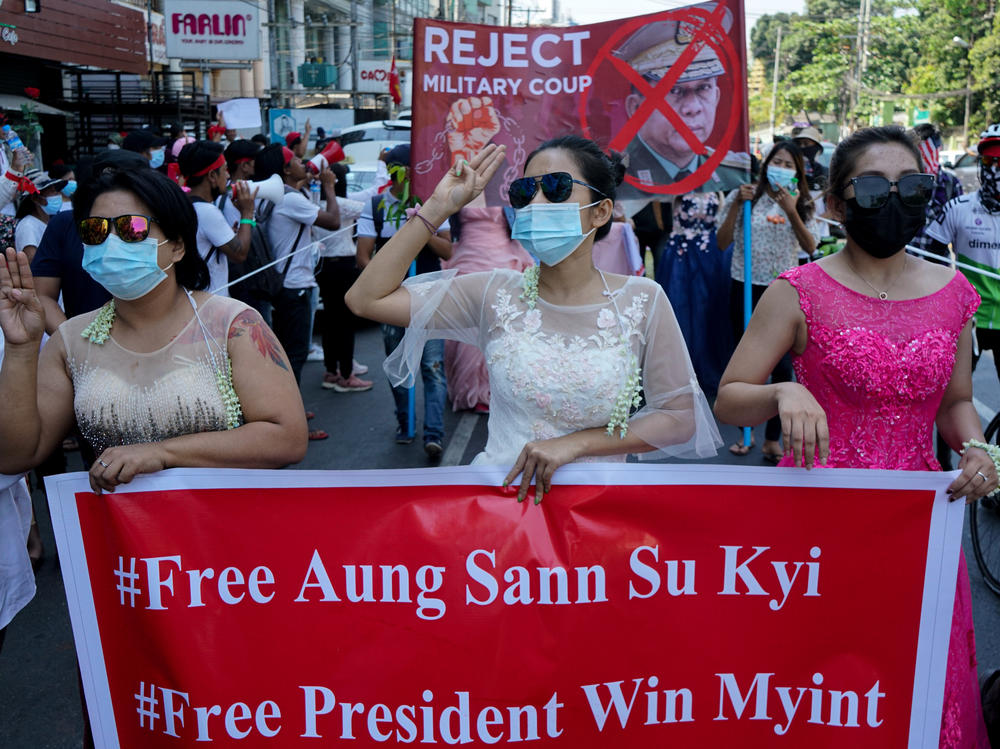Section Branding
Header Content
U.S. 'Stands With The People,' Imposes Sanctions On Myanmar's Coup Leaders
Primary Content
Updated at 2:51 p.m. ET
The Biden administration has imposed sanctions on 10 current and retired top-ranking leaders in Myanmar's military following a coup earlier this month that toppled the democratically elected government led by Aung San Suu Kyi.
In a statement issued Thursday afternoon, the Treasury Department announced it was freezing U.S.-based assets belonging to the sanctioned individuals. The list includes six members of the newly installed junta, including its head, Senior Gen. Min Aung Hlaing, and his deputy, Soe Win. Hlaing was already on a U.S. sanctions list from 2019, when he was targeted for the army's brutal crackdown on Rohingya Muslims in the country's western Rakhine state.
The Feb. 1 coup in Myanmar, also known as Burma, came in response to elections that easily returned Suu Kyi and her National League for Democracy to power, while meting a stinging defeat to the military. After taking power, Min Aung Hlaing ordered the arrest of Suu Kyi, who held the title of state counselor, as well as President U Win Myint.
Noting that President Biden had called the coup "a direct assault on Burma's transition to democracy and the rule of law," Treasury Secretary Janet Yellen said in the statement that the department, "stands with the people of Burma — and we are doing what we must to help them in their effort to secure freedom and democracy."
"We are also prepared to take additional action should Burma's military not change course," Yellen said. "If there is more violence against peaceful protestors, the Burmese military will find that today's sanctions are just the first."
Separately, the U.S. Agency for International Development announced that it was "immediately redirecting $42.4 million of assistance away from work that would have benefited the Government of Burma. Rather than supporting the military, we will redirect these funds to support and strengthen civil society."
In brief remarks on Wednesday, Biden telegraphed Thursday's moves, and called on Myanmar's military to release Suu Kyi, a Nobel Peace Prize laureate, and U Win Myint.
"The people of Burma are making their voices heard, and the world is watching," Biden said. "We'll be ready to impose additional measures, and we'll continue to work with our international partners to urge other nations to join us in these efforts."
The military takeover has sparked the biggest protests in Myanmar since the 2007 "Saffron Revolution" that helped lay the groundwork for Suu Kyi's eventual 2015 election victory after spending 15 years under house arrest at the hands of a previous junta.
Again on Thursday, protesters, including teachers and government workers, gathered across the country. In the capital, Naypyitaw, hundreds of workers chanted anti-junta slogans and carried signs supporting Suu Kyi, according to The Associated Press. In his first public remarks aimed at the protesters, Min Aung Hlaing blamed "unscrupulous persons" for the growing civil disobedience, the AP said.
In addition to the 10individuals, three wholly owned subsidiaries of a large conglomerate in Myanmar with ties to the military, Myanmar Ruby Enterprise; Myanmar Imperial Jade Co., Ltd., and Cancri (Gems and Jewelry) Co., Ltd., were also sanctioned.
In a separate statement on Thursday, the State Department said the sanctions "specifically target current or former members of the military who played a leading role in the overthrow of Burma's democratically-elected government."
"They do not target the economy or people of Burma, and we have gone to great lengths to ensure we do not add to the humanitarian plight of the Burmese people," the department said.
Copyright 2021 NPR. To see more, visit https://www.npr.org.

